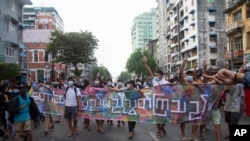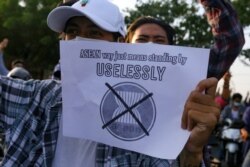(Since the Feb. 1 coup in Myanmar, journalists have been persecuted, arrested and forced to flee. The situation is dire, but some reporters have remained despite the risks. This is a personal account of one such journalist about life since the coup. VOA is withholding the journalist’s identity for security reasons.)
YANGON, MYANMAR -- Being a journalist in Myanmar after the coup feels like working in the dark. I take every step carefully, but at any moment I could take a fall that would ruin the rest of my life.
I have been living in insecurity for the nearly four months since the military took power.
I arrived in Naypyitaw, the administrative capital of Myanmar, a week before the coup. When the coup took place, amid increased security forces, I had to report on the situation by day, and passed sleepless nights in light of unconfirmed reports that journalists could be arrested at night.
Fortunately, after having spent a few days in Naypyitaw, I returned to Yangon without any trouble, but I still feel insecure, and pass my nights sleeplessly.
Myanmar’s military, making accusations of electoral fraud, overthrew the National League for Democracy government, which won a landslide victory in last year’s election. A few days later, thousands of protesters across the country took to the streets. They demanded the release of the country’s leaders, including de facto national leader Aung San Suu Kyi, and others detained by the junta. They also asked for the restoration of democracy.
Myanmar’s State Administrative Council, led by the coup leader, Senior General Min Aung Hlaing, cracked down violently on protesters. Security forces have arrested scores of journalists and revoked the licenses of several news outlets. As of May 28, 87 journalists or news staff members have been arrested, 51 of whom are still in detention, according to the ASEAN Reporting and Detained Journalist Facebook group, which was set up by local journalists to share information. The SAC has issued arrest warrants for a further 22 over social media comments. In nearly all cases they are charged under Section 505(a) of Penal Code, which carries a sentence of up to three years in prison. The article makes it a crime to cause fear, spread false news, or commit a criminal offense against a government employee.
Some media outlets, such as Myanmar Now, Khit Thit and Mizzima, have left the city and report from jungle locations. Many journalists have lost their jobs, or resigned because of security concerns.
The junta hasn’t shut down my news outlet, and despite the difficulties and security concerns, my desire is to stay, to keep track of what is happening in Myanmar and to share information at home and abroad to contribute more in the fight against dictatorship.
We local journalists remaining face an array of hardships.
At my outlet, bylines have been replaced with the news agency name to try to keep the journalists safe. In the early days of coup, journalists identified themselves as press to avoid arrest, and make it easier to establish contact with protesters. Later, we understood that doing so invited danger rather than providing protection. Journalists reporting on atrocities at home and abroad were targeted by the security forces. Photojournalists stopped using their professional cameras, but even taking pictures with a phone can invite problems.
Trying to gather information at anti-coup protests is hard. People don’t trust us. They are worried about strangers after informers shared details on their activities with local authorities. In some cases, I have been barred from covering events.
Now, when I report on a protest, the first thing I do is introduce myself to the leaders to gain their trust.
Mass gatherings have gradually dispersed on the streets in Yangon, but soldiers continue to stop vehicles, check people’s mobile phones, and make arrests if they see anything related to the protest movements.
Because of the worsening security situation, we communicate with editors, other colleagues and sources by internet and mobile phone rather than meeting in person. Communicating on mobile phones is dangerous for me and my news sources because the military can intercept conversations. Unfortunately, we were left with no choice when the military cut of mobile internet and Wi-Fi completely. Fiber connections were allowed for the internet but can be used only in cities because many parts of the country do not have access to fiber connections. This closure made it very difficult for me to work and to communicate with my news sources.
Most politicians are in hiding. Some have reached the border and have access to internet, so they can give interviews and share information about their activities.
Living on the outskirts of Yangon, without access to fiber connections, I had to go to work at a friend’s house and had to carry my laptop and mobile phones, which contain lots of information including information relating to the military coup and protest movements. I was aware that I could be stopped and my devices checked. It’s a risky way to operate, but I must take that risk to be able to report news on time.
The military is arresting journalists not only in the city but also in the countryside. News agency founders and editors have been detained at their homes. The arrest of American journalist Danny Fester, who is managing editor of the Yangon-based Frontier Myanmar, alarmed me. He was detained at the Yangon airport without advance notice. I have the sense that anyone could be arrested at any time, without being given any reason.
So far, although I can do real reporting, I realize that the dreadful situation for my fellow journalists could affect me at any time.
Since the coup, Myanmar’s media situation has reverted back to what it was in 2010, before the country began its moves toward democratization.
Based on my experience working under the military censorship body that was abolished in 2012, I expect that the junta will bring more pressure by setting up a similar committee to enforce laws.
I cannot predict how long the persevering press freedom and media organizations will be allowed to operate. Despite the challenges, I am eager to stay and report for as long as I am able.






